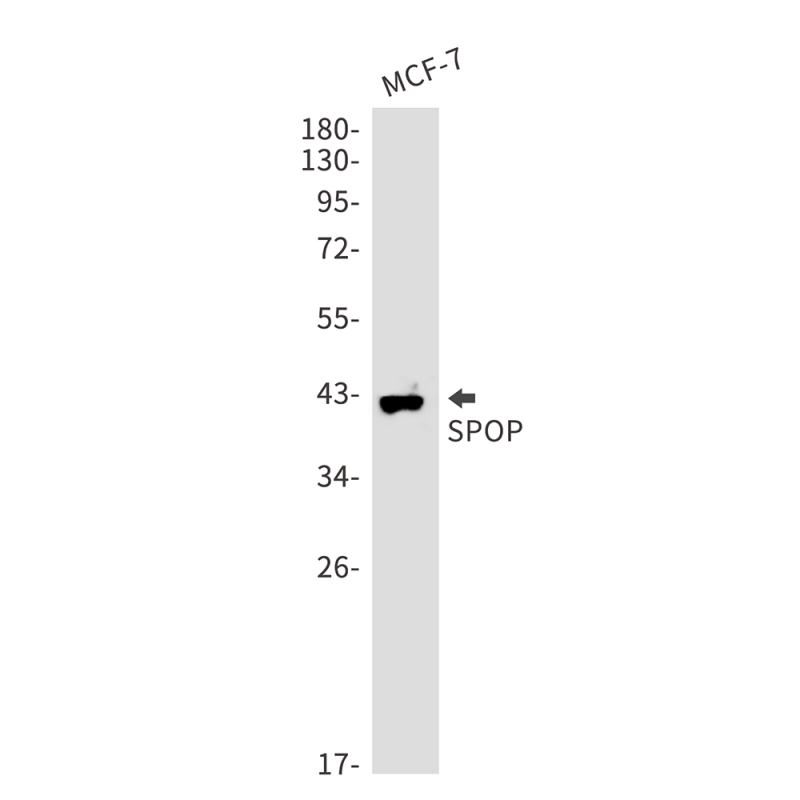
| WB | 1/500-1/1000 | Human,Mouse,Rat |
| IF | 咨询技术 | Human,Mouse,Rat |
| IHC | 咨询技术 | Human,Mouse,Rat |
| ICC | 技术咨询 | Human,Mouse,Rat |
| FCM | 咨询技术 | Human,Mouse,Rat |
| Elisa | 咨询技术 | Human,Mouse,Rat |
| Aliases | Speckle-type POZ protein; HIB homolog 1; Roadkill homolog 1 |
| Entrez GeneID | 8405 |
| WB Predicted band size | Calculated MW: 42 kDa; Observed MW: 42 kDa |
| Host/Isotype | Rabbit IgG |
| Antibody Type | Primary antibody |
| Storage | Store at 4°C short term. Aliquot and store at -20°C long term. Avoid freeze/thaw cycles. |
| Species Reactivity | Human |
| Immunogen | A synthetic peptide of human SPOP |
| Formulation | Purified antibody in TBS with 0.05% sodium azide,0.05%BSA and 50% glycerol. |
+ +
以下是关于SPOP抗体的3篇参考文献,简要概括内容:
1. **标题**:*SPOP mutations promote tumorigenesis through regulation of tumor microenvironment*
**作者**:Li G. et al.
**摘要**:研究SPOP基因突变在前列腺癌中的作用,利用SPOP抗体分析突变对肿瘤微环境中免疫细胞募集的影响,揭示其通过调控炎症信号通路促进肿瘤进展。
2. **标题**:*Structural basis of SPOP substrate recognition and its implications in cancer*
**作者**:Zhuang M. et al.
**摘要**:通过SPOP抗体结合结构生物学手段,解析SPOP蛋白与底物结合的分子机制,阐明其在肾细胞癌中突变导致底物识别异常的病理机制。
3. **标题**:*SPOP-mediated ubiquitination regulates DNA repair and tumor chemoresistance*
**作者**:Zhang J. et al.
**摘要**:使用SPOP抗体检测其在乳腺癌细胞中的表达,发现SPOP通过泛素化调控DNA修复蛋白稳定性,影响化疗耐药性。
如需具体文献来源(期刊/年份),可进一步补充说明。
The SPOP (Speckle-type POZ protein) antibody is a crucial tool in studying the role of SPOP, a substrate-binding adaptor for the CUL3-based E3 ubiquitin ligase complex. SPOP facilitates the ubiquitination and subsequent proteasomal degradation of target proteins, regulating pathways such as cell cycle progression, apoptosis, and signal transduction (e.g., Hedgehog, androgen receptor pathways). Dysregulation of SPOP is implicated in cancers, notably prostate and endometrial cancers, where recurrent mutations disrupt its substrate-binding ability, leading to oncoprotein stabilization.
SPOP antibodies are widely used in research to detect SPOP expression, localization (primarily nuclear speckles), and interaction partners via techniques like immunohistochemistry, immunofluorescence, and immunoprecipitation. They also help characterize SPOP mutations and their functional consequences in tumorigenesis. Recent studies highlight SPOP’s tumor-suppressive or context-dependent oncogenic roles, making its antibodies vital for exploring therapeutic targets. Additionally, autoantibodies against SPOP have been investigated in autoimmune disorders, though their clinical significance remains less defined. Overall, SPOP antibodies advance understanding of ubiquitin-mediated proteolysis in health and disease.
(Word count: 199)
×